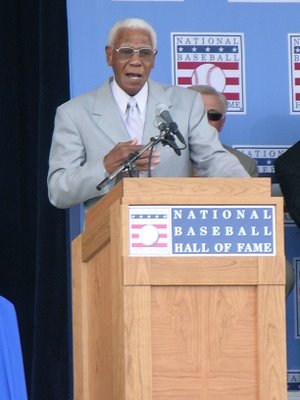 *****Buck O'Neil, 1911-2006*****
*****Buck O'Neil, 1911-2006*****"This is not a sad story. It's a celebration!"
That is what Buck O'Neil would often say to people who would lament the fact that he and countless other baseball players, managers and officials were relegated to the Negro leagues in the segregated America of yore.
The same sentiment how should hold true as we say good-bye to Buck O'Neil, who died at age 94 Friday night.
Major league baseball and the world at large will say one last, loving farewell to Mr. O'Neil, the man who put the human face on an era and the leagues in which he played and managed.
Remembering O'Neil should be done in a way he would appreciate.
Honor the man who used an unending supply of grace to help a game and a nation come to terms with its disgrace of a past.
Emulate the man who never knew bitterness, self-pity or hate, but rather embraced this nation and its national pastime with all his heart and soul.
Allow the positive lesson to sink in that it is possible to find humanity in an institution, in a society despite both having kept countless Americans disenfranchised simply because of the color of their skin.
O'Neil, of a generation that saw the worse side of modern America's intolerance, found that humanity, and more. For that reason, alone, Buck O'Neil was right when he said he wasn't born too soon, but right on time.
Because while he was surely valued as a player, then longtime manager of the Kansas City Monarchs, O'Neil's greatest legacy will be how he proved to be the perfect interpreter of America's imperfect, painful past.
A walking, talking font of history, O'Neil put dimension, humanity and perspective into countless stories populated by the likes of Jackie Robinson, Satchel Paige and Josh Gibson, Babe Ruth, Lou Gehrig and Bob Feller.
The pictures he painted of the players of the 20s, 30s, 40s and beyond, be they white or black, big or small, were vivid. And the recounting of their trials and tribulations were touching, funny, revealing.
Most important, Buck O'Neil's recounting of the era in which all the greats lived, on one side or the other of the color line, did more than illuminate. It showed how to come to terms with what had been.
For who could fume about such history in front of a man who lived it yet still projected nothing other than goodness and compassion, patience, faith and, above all, forgiveness?
Just this summer, O'Neil showed, again, the amazingly forgivng heart held in his then-frail frame.
For he watched as baseball welcomed its largest - and likely last - class of Negro League luminaries into the Baseball Hall of Fame and Museum in Cooperstown. While many in the baseball world were outraged and embarrassed that O'Neil was not allowed to join those 17 selected by a specially-appointed screening committee, O'Neil refused to fuel the fury.
Instead, he came to Cooperstown to welcome those bygone greats into a fraternity that never found a way to include him - much the way the game, itself, did not invite him in to play on the major-league stage.
By doing so, O'Neil showed once more a love of the game. And he used that love to coax an arguably unworthy sport through yet another pitifully awkward chapter.
No one who was there will ever forget that bright, sunny day in rustic New York when O'Neil showed us all how beautiful magnanimity can be.
"I want you to light this valley up today," said O'Neil told an enthralled audience of Hall of Famers, baseball execs, media and fans.
The audience did, especially when Buck O'Neil, part Southern black preacher, part performing artist, asked the audience to join hands and sing with him a repeated refrain:
"The greatest thing in the world is loving you."
Again and again, we all did sing. And how we loved the moment, and how we loved Buck O'Neil.
Hall of Famer? You'd better believe it, a million times over, forever and always, in heaven as he was on earth.